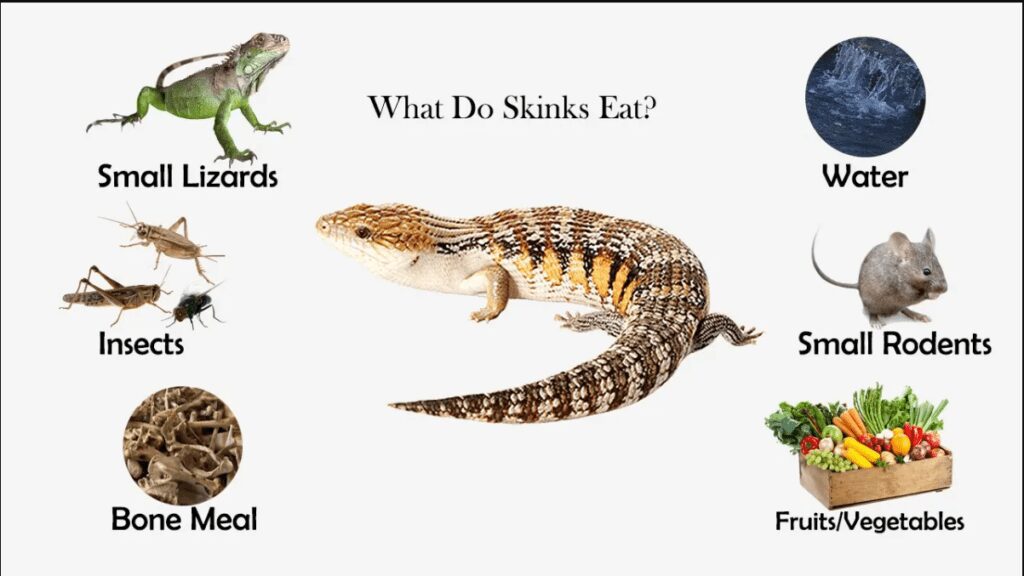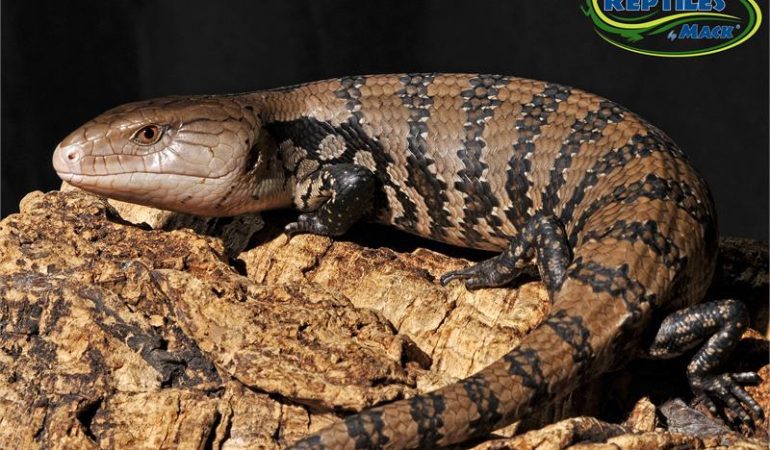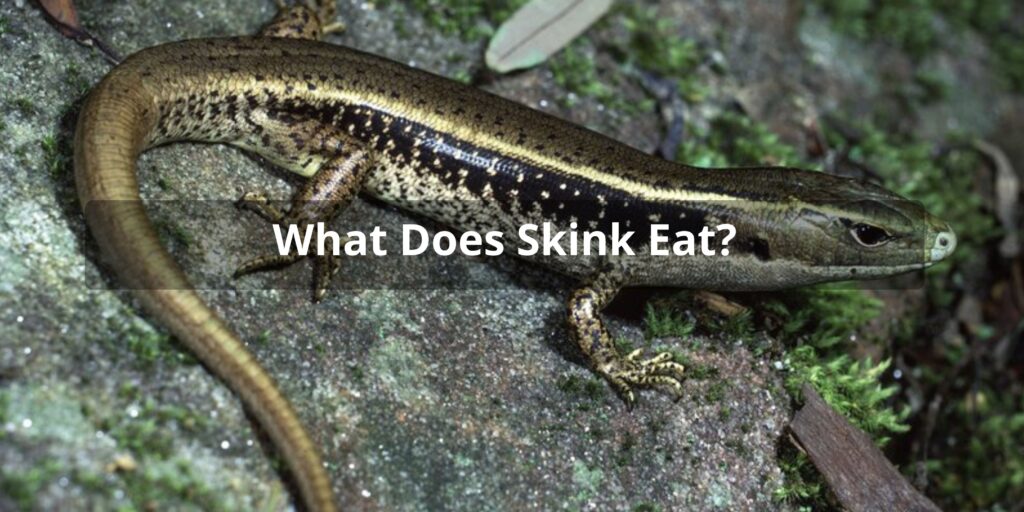Welcome to our comprehensive guide on the dietary habits of skinks! If you’re a new skink owner or simply curious about these fascinating reptiles, understanding their nutritional needs is key to keeping them healthy and happy. In this article, we will delve into what skinks typically eat, including live food, vegetables, fruits, and essential vitamins and minerals. Additionally, we will highlight some food items that should be avoided due to potential risks. Let’s explore the diverse world of skink nutrition together!
Skink Feeding
Skinks have specific dietary requirements that consist of both insect and plant-based foods. The ratio of these two components may vary depending on the species of skink and its age. Here are some general guidelines on feeding skinks:
- Insect Food Ratio: As a rule of thumb, juvenile skinks require a higher proportion of insects in their diet compared to adult skinks. A suitable ratio for juveniles would be approximately 80% insects and 20% plant matter. For adults, a balanced ratio of 50% insects and 50% plant matter is recommended.
- Feeding Frequency: Skinks generally benefit from regular feeding schedules. Juveniles should be fed daily, while adults can be fed every other day or three times a week. Adjusting the frequency based on your skink’s behavior and appetite can help ensure they receive proper nourishment.
What do Skinks Eat?

Live Food
Skinks are primarily insectivores, and feeding them live prey provides essential nutrients and mental stimulation. Here is a list of various live food options suitable for skinks:
- Crickets: These versatile insects are readily available and constitute a staple part of a skink’s diet. They are rich in protein and can be dusted with supplements to improve their nutritional value.
- Mealworms: These larvae of darkling beetles are another popular choice for feeding skinks. They are high in protein and can be offered both live and as part of a balanced diet.
- Dubia Roaches: These roaches are great alternatives to crickets, especially for skinks that may have allergies or sensitivities. They offer a similar nutritional profile and can be easily sourced from specialty breeders.
- Silkworms: Known for their soft bodies, silkworms are highly nutritious and low in fat. Skinks typically enjoy these worms, which can be purchased in various sizes to accommodate different age groups.
- Waxworms: While waxworms are high in fat, they should be offered sparingly as occasional treats rather than staple food. Providing variety in a skink’s diet can enhance their overall health.
- Phoenix Worms: Also known as black soldier fly larvae, these small creatures are calcium-rich and make for an excellent addition to a skink’s menu. They have a soft exoskeleton, making them easy to digest.
- Superworms: These beetle larvae are larger than mealworms and provide good nutrition. However, due to their harder exoskeleton, they should be offered to adult skinks or those with stronger jaws.
- Grasshoppers: In the wild, skinks would naturally prey on grasshoppers. Offering these insects as occasional treats can mimic their natural foraging behavior.
Vegetables
Skinks also benefit from including plant matter in their diet. Here are some safe vegetables that you can regularly offer to your skink:
- Collard Greens: Rich in vitamins A and C, collard greens are excellent leafy greens that can be chopped into bite-sized pieces for your skink.
- Mustard Greens: These leafy greens are packed with essential nutrients and add variety to your skink’s diet.
- Kale: A nutritional powerhouse, kale is high in calcium and can be incorporated into your skink’s meals to promote bone health.
- Swiss Chard: This colorful vegetable provides a range of vitamins and minerals while introducing different flavors for your skink to enjoy.
- Bok Choy: With its unique taste and crunchy texture, bok choy can be a refreshing addition to your skink’s vegetable options.
- Squash: Cooked squash, such as butternut or acorn squash, can be mashed and mixed with other vegetables to provide added nutrition and moisture.
- Zucchini: This versatile vegetable is easy to prepare and can be grated or chopped into small pieces to entice your skink.
- Bell Peppers: Red, yellow, and green bell peppers offer a good source of vitamin C and can add vibrancy to your skink’s meal.
Fruit
While fruits should not be the primary component of a skink’s diet due to their higher sugar content, they can be offered as occasional treats. Here are some safe fruit options for your skink:
- Blueberries: These small, antioxidant-rich fruits can be a tasty and nutritious addition to your skink’s diet.
- Papaya: Rich in vitamins A and C, papaya can provide a sweet and tropical flavor for your skink to enjoy.
- Mango: This juicy fruit is packed with vitamin C and dietary fiber. It can be a refreshing treat for your skink on occasion.
- Strawberries: With their vibrant color and natural sweetness, strawberries are a delightful snack option for your skink.
- Pears: When ripe and soft, pears can be sliced into small pieces and offered as a special treat for your skink.
- Apples: Remove the seeds and core, then dice the apple into small, bite-sized pieces before offering them to your skink.
- Watermelon: Skinks may enjoy the watery and hydrating texture of watermelon, but it should only be given occasionally due to its high water content.
- Bananas: Although bananas are higher in sugar, they can be provided sparingly and in small amounts as an occasional treat.
Vitamins & Minerals
To ensure your skink receives all the necessary nutrients, it’s important to supplement their diet with vitamins and minerals. Here are some essential supplements for your skink:
- Calcium Powder: Calcium is crucial for maintaining strong bones and preventing metabolic bone disease. Dusting the skink’s food with calcium powder ensures they receive adequate calcium intake.
- Vitamin D3 Supplement: Vitamin D3 aids in the absorption of calcium. It is recommended to use a reptile-specific vitamin D3 supplement to prevent deficiencies.
- Multivitamin Supplements: Providing a multivitamin supplement once or twice a month can help cover any potential nutritional gaps in your skink’s diet.
What Can’t They Eat?
While skinks have diverse dietary preferences, there are certain foods that should be avoided due to potential health risks. Here is a list of foods that skinks should not consume:
- Toxic Insects: Avoid feeding skinks insects that are known to be toxic, such as fireflies or certain types of beetles. These insects can be harmful or even fatal to your skink.
- Toxic Plants: Some plants are toxic to skinks and should never be included in their diet. Examples include lilies, philodendron, and daffodils. Make sure to research the safety of any plant before offering it to your skink.
- Citrus Fruits: Citrus fruits, such as oranges and lemons, have high acidity levels that can upset a skink’s digestive system. It’s best to avoid feeding them these fruits.
- Avocado: Avocado contains a substance called persin, which is toxic to many reptiles, including skinks. Never offer avocado to your skink.
- Onions and Garlic: These members of the allium family can be toxic to skinks, causing damage to their red blood cells. They should be avoided completely.
- Processed Foods: Junk food, sugary snacks, and processed meats should not be fed to skinks. Stick to natural and fresh food options instead.
Rules and Tips for Feeding Your Skink

To ensure your skink’s feeding routine is successful and beneficial, here are some essential rules and tips to follow:
- Fresh Water: Provide clean, fresh water for your skink at all times. Use a shallow dish that is easy for them to access and clean it regularly.
- Variety is Key: Offer a diverse range of food items to keep your skink interested and provide balanced nutrition. Rotate between different insects, vegetables, and occasional fruit treats.
- Gut Loading: If you choose to breed insects for your skink’s diet, make sure to “gut load” them. This involves feeding the insects with nutritious foods before offering them to your skink, ensuring they receive optimal nutrition.
- Proper Hygiene: Maintain cleanliness in your skink’s enclosure and food dishes to prevent bacterial growth and potential health issues.
- Monitor Consumption: Pay attention to your skink’s appetite and adjust feeding amounts accordingly. Overfeeding can lead to obesity, while underfeeding can result in malnutrition.
- Consult a Veterinarian: If you have any concerns about your skink’s diet or overall health, consult a reptile veterinarian for professional advice and guidance.
How about Water?
Skinks require access to fresh water for hydration and maintaining bodily functions. Ensure that a shallow dish of clean water is available in their enclosure at all times. It is important to regularly monitor and refill the water dish to prevent dehydration.
Skinks Diet: Frequently Asked Questions (FAQ)
1. What do skinks eat?
Skinks are omnivorous reptiles, meaning they eat both plant-based and animal-based foods. Their diet includes insects, fruit, small mammals, and invertebrates.
2. What are the main food sources for skinks?
The primary food source for skinks is insects. They have a diverse appetite and can consume a variety of insects, including flies, crickets, roaches, moths, slaters, earthworms, flies, grubs, caterpillars, grasshoppers, and cockroaches.
3. Do skinks eat fruits and vegetables?
Yes, skinks are known to eat fruits and vegetables as part of their omnivorous diet. While insects remain the main component of their food intake, skinks also enjoy fruits like apricots and papaya, as well as fresh greens and vegetables like carrots, bell peppers, and squash.
4. How often do skinks need to eat?
Skinks do not need to eat every day, but they will do so when conditions are favorable. Their feeding frequency may vary depending on factors such as age, species, and environmental conditions. Juvenile skinks may require more frequent feedings to support their growth.
5. What should I feed my pet skink?
For pet skinks, it is essential to replicate their natural diet. Offer a variety of live insects, such as crickets, mealworms, and roaches, as the primary food source. Additionally, provide fresh fruits and vegetables as occasional treats to ensure a balanced diet.
6. Are there any foods skinks should avoid?
While skinks have a diverse diet, there are certain foods they should avoid. Skinks should not be fed food treated with pesticides or any toxic substances. Also, certain foods like rhubarb and citrus fruits should be avoided due to their high oxalate content and acidity, respectively.
7. What is the role of insects in a skink’s diet?
Insects play a vital role in a skink’s diet as the main source of protein and essential nutrients. They provide the necessary energy for skinks to thrive and support their growth and development.
8. How should I care for my pet skink’s diet?
When caring for your pet skink’s diet, ensure a variety of insects is provided to offer a balanced nutritional intake. Always provide fresh water in a shallow dish for proper hydration. Monitor your skink’s eating habits and adjust their diet as needed to maintain their health and well-being.
9. Do skinks need water?
Yes, skinks need access to fresh water at all times. Although they obtain most of their hydration from the food they eat, providing a shallow dish of water ensures they can drink when needed.
Conclusion
Understanding what skinks eat is crucial for providing optimal care for these unique reptiles. Their diet should consist of a balanced combination of live food, vegetables, fruits (as occasional treats), and necessary supplements. Avoid feeding them toxic insects, plants, and certainfruits like citrus and avocado. Following the guidelines mentioned in this article will help ensure a healthy and well-rounded diet for your skink.
Remember, if you have any specific concerns or questions about your skink’s diet, it is always best to consult with a reptile veterinarian who can provide tailored advice based on your skink’s individual needs. By providing the right balance of nutrients and carefully monitoring their food intake, you can help your skink thrive and lead a happy, healthy life.



